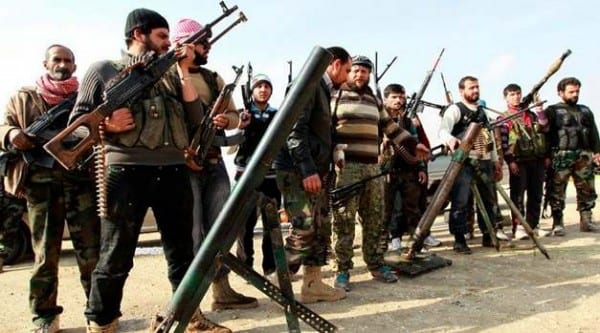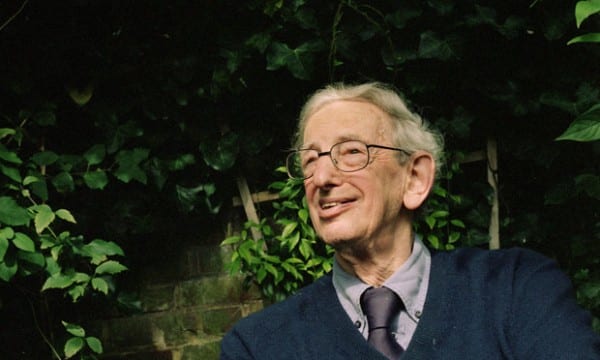Stoking Fear as the US Prepares for the Next War in the Middle East
Dave Lindorff, ThisCantBe Happening
[dropcap]Y[/dropcap]ou read it in USA Today: The latest “threat to America” is “thousands of jihadis” with Western passports,” returning from battle in Syria and Iraq to wreak havoc and destruction in the “US homeland.”
It’s a nightmare profoundly hoped for by the US Department of Homeland Security, that massive security-state bureaucracy looking for a raison d’être.
According to the USA Today article [1], there “may be” thousands of so-called Islamic State fighters who have western passports, including “perhaps” some 150-300 Americans. The fear expressed in this heavy-breathing piece is that since these fighters, once in Syria or Iraq, will be coming under fire by US planes, which are bombing IS forces and, reportedly, killing hundreds of them, and that they will turn their anger from the apostates they went abroad to fight to the US government and perhaps the American people who were supporting this campaign that is trying to kill them and their IS comrades-in-arms.
Another way to look at this would be to say, “A fine mess you’ve gotten us into Mr. Obama!”
CLICK IMAGES TO EXPAND
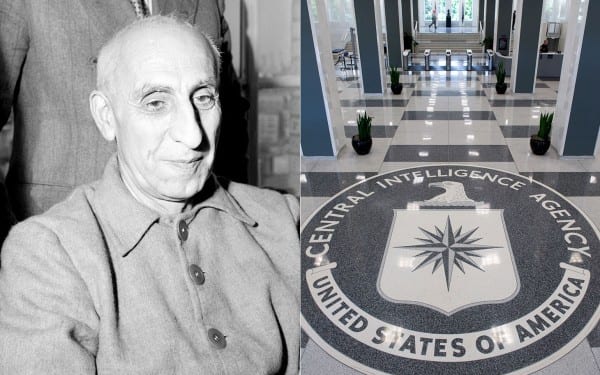
The hapless Mossadegh: His big crime was to be a nationalist in possession of a precious commodity coveted by the international vultures.
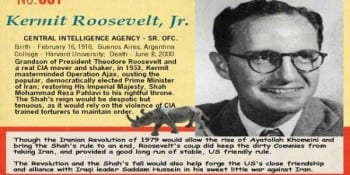
Kermit Roosevelt: A key player in the Anglo-American overthrow of Iran’s dutifully elected government. Malignant frat pranks by a spoiled brat of the Roosevelt clan. The consequences of Kermit’s “success” in Iran would prove disastrous for all parties concerned.
The invasion of Iraq in 2003 orchestrated by Vice President Dick Cheney and his neo-con braintrust is another example of blowback. By destroying the government of Saddam Hussein, Cheney and his gang destroyed the country of Iraq, ignited a vicious civil war between Iraqi Sunnis and Shiites, and ultimately brought forth the Islamic State forces. In a smaller example of blowback, the CIA and Pentagon secretly trained and armed fanatic Islamic Sunni fighters opposed to Syrian dictator Bashar al Assad, only to have those fighters decide a better target was the oppressive Shi-ia regime in Iraq. The US-trained Sunni fighters became the core of the Islamic Republic which the US is now committed to trying to destroy. Hence the concern about US jihadi fighters who are part of the IS army turning their wrath on the US.
How serious a risk do these perhaps dozens of IS fighters with US passports pose to the security of American citizens here in the US? Probably not much. Certainly no more of a risk than that posed by some of the hundreds of thousands of frustrated and angry US soldiers who are shipped off to fight America’s imperial wars, only to find out later that they have been simply enforcers of US imperialism, and that the buddies they lost, or the limbs or parts of their brains that they themselves lost, were sacrificed not to “protect America’s freedom,” but to make the world safe for Exxon, Goldman Sachs and RJ Reynolds, or to enrich the likes of Boeing, Litton Industries and Halliburton.
You won’t read an article in USA Today warning about the risk of some American GI’s and Marines returning to US shores with mayhem on their minds, but I suspect that the threat posed by some angry vets fed up with being lied to by the politicians in Washington, and shunned or patronized by the American public just flipping out and “going postal” is probably greater than the threat posed by a few dozen angry returning American IS fighters.
Nonetheless, there are some in Congress and among the American public who would would like to see the US yank the passports of any US citizen who left this country to go fight with IS in the Middle East. In fact, as one article in FireDogLake [2] points out, they are already doing that, and probably, in secret, they are doing it on a significant scale.
This induced panic about “returning American jihadis” is just the latest example of an ongoing campaign by Washington leaders to deliberately stoke fears of terrorism, the better to continue what by one estimate has been a totally failed 13-year, $4-trillion War on Terror [3], of which the expanding but undeclared US war on the so-called Islamic State is just the latest example.
The reality of course is that this “war” has not only done nothing to prevent, much less eliminate terrorism, but has caused it to expand exponentially, from one poorly organized and dispute-riven outfit called Al Qaeda, to a welter of organizations, some armed to the teeth with captured and even government-provided US weapons. Worse yet, the US itself has become the world’s number one terrorist organization,(1) a rogue state extraordinaire, responsible for the deaths of hundreds of thousands(2) of innocent men, women and children (all deemed simply “regrettable” collateral damage). And at the same time, although even today terrorism poses no existential, or even significant threat to the American people or to the country, this “War” on Terror has also been a very effective war on American democracy and on our freedoms, with the Bill of Rights now little more than a museum relic and a bit of patriotic mythology, on a par with that apochrophal story about little George Washington and the cherry tree.
Let’s be clear: the only way to reduce all the violence and killing in the Middle East is for the US to pack up and go home, and to stay there. And that includes ending all military support for Israel. Nothing the US has done for decades in that troubled region has achieved anything good. In fact, US policy in the Middle East has been a primary agent promoting sectarian violence, military dictatorship, and international conflict. Oh, and by the way, if and when some returning US jihadi does try to blow something up in the US, when the plot is foiled, history suggests [4] that we’ll eventually learn there was an FBI undercover operative who suggested the idea, provided funding and set the whole thing in motion.
We don’t need any more War on Terror. We need a war on the terrorizers and the US war machine they keep promoting.
MI5 spied on leading British historians for decades, secret files reveal
Eric Hobsbawm and Christopher Hill had phones tapped, correspondence intercepted and friends and wives monitored
A REPORT BY THE GUARDIAN (UK)
[dropcap]MI5[/dropcap] amassed hundreds of records on Eric Hobsbawm and Christopher Hill, two of Britain’s leading historians who were both once members of the Communist party, secret files have revealed.
The scholars were subjected to persistent surveillance for decades as MI5 and police special branch officers tapped and recorded their telephone calls, intercepted their private correspondence and monitored their contacts, the files show. Some of the surveillance gave MI5 more details about their targets’ personal lives than any threat to national security.
The files, released at the National Archives on Friday, reveal the extent to which MI5, including its most senior officers, secretly kept tabs on the personal and professional activities of communists and suspected communists, a task it began before the cold war. The papers also show that MI5 opened personal files on the popular Oxford historian AJP Taylor, the writer Iris Murdoch, and the moral philosopher Mary Warnock after they and Hill signed a letter supporting a march against the nuclear bomb in 1959.
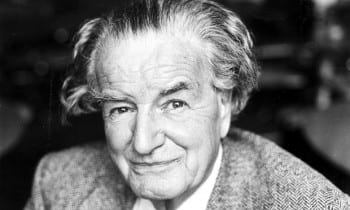
Christopher Hill was a celebrated historian of the English civil war. Photograph: Jane Bown/Guardian
Hobsbawm, who was refused access to his files when he asked to see them five years ago, died in 2012, and Hill died in 2003. Many passages, sometimes whole pages, of their files remain redacted and an entire file on Hobsbawm has been “temporarily retained”. The files include long lists of names and addresses of letters written by Hobsbawm and Hill.
They make clear that MI5 frequently read – or was sent – copies of as many as 10 letters a day. At the same time, its officers, or special branch officers, or their informants – one of whom was given the codename Ratcatcher – were secretly taking notes of their phone calls and meetings.
The relentless castigation of the Stasi as a political horror sounds a bit hollow when we examine the history of Western police and intelligence agencies and their often sordid acts to stifle dissent.
The files show that Hobsbawm, who became one of Britain’s most respected historians and was made a Companion of Honour while Tony Blair was prime minister, first came to the notice of MI5 in 1942 when he and 38 colleagues were described as being “obvious members of the CPGB [the Communist party of Great Britain] on Merseyside”. He became number 211,764 on MI5’s index of personal files. Although he was cleared of “suspicion of engaging in subversive activities or propaganda in the army”, MI5 noted it was doubtful that he would be suitable for the Intelligence Corps. Roger Hollis, later head of MI5, and Valentine Vivian, the deputy chief of MI6, prevented him from joining the Foreign Office’s political intelligence department.
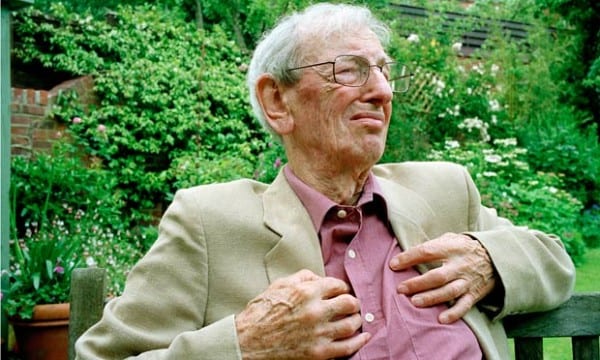
Eric Hobsbawm: ‘a revolutionary traditionalist’. Photograph: Eamonn Mccabe for the Guardian Eamonn Mccabe/Guardian
[box type=”bio”]
The persecution of Hobsbawm is all the more ludicrous because the man was, while a competent historian, the equivalent of a modern Fabian, a self-declawed socialist in the style of left-liberals so common in the US.
As the Guardian itself put it when describing Hobsbawm,
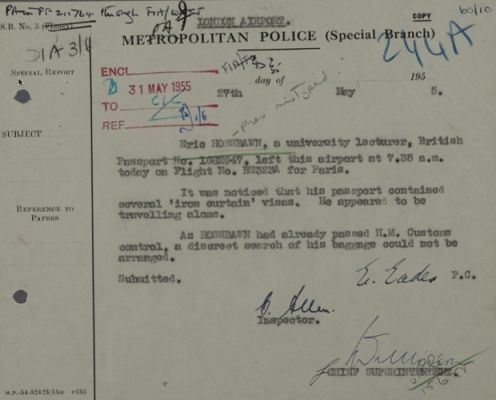
Telephone intercepts disclosed that Hobsbawm and his family were friendly with Alan Nunn May – a British physicist who had confessed to spying for Russia and was released from jail in 1952 – and on one occasion put him up for the night. There is no evidence in the files of any attempt by either Hobsbawm or Hill to spy for Moscow or that the Russians were interested in them for any such purpose.
One early file on Hobsbawm describes his uncle Harry, with whom he sometimes stayed, as “sneering, half Jew in appearance, having a long nose”.
The surveillance intruded into the targets’ relationships. Hobsbawm is recorded in 1952 as having “difficulties with his [first] wife, who,” an MI5 officer noted, “does not consider him to be a fervent enough Communist”.
A report in 1950 revealed how Hill’s first wife, Inez, was becoming “sick to death” of his Communist party affiliation, which she had previously shared. “There seems to be some reason to believe that she is not only fed up with her husband’s politics but also with her husband’s political activities, especially as his political sympathies lead him, according to her, to give a considerable amount of his money to the party,” the report stated. A subsequent report revealed she was having an affair with another Communist party official.
Hobsbawm never left the Communist party but the MI5 files show he argued with the party leadership so strongly that it considered dismissing him, according to transcripts of MI5’s bugged conversations.
Unlike the very public manifestation of McCarthyism in the US, the discreet British version had its victims. Although political activities did not affect Hill’s academic career, Hobsbawm was prevented from getting the Cambridge lectureship he wanted. He was later appointed professor at Birkbeck College, London.
The documents show that years later MI5 was furious with the BBC for allowing Hobsbawm to broadcast. In October 1962, an MI5 officer noted: “My BBC contact tells me that Hobsbawm is still an occasional contributor to the Third Programme … Some recent talks were entitled ‘Sicilian Peasant Risings’ and ‘Robin Hood’.” What is described as “slightly unexpected” was a series of talks on “Jazz”.
Earlier that year, MI6 asked MI5 if they had any objection to telling the CIA that Hobsbawm was going on a tour of South America funded, to its surprise, by the Rockefeller Foundation (Hobsbawm had already visited Cuba). In a document marked Top Secret, dated 13 May 1963, MI5 told MI6: “A reliable and very delicate source has reported that Hobsbawm visited a number of countries.”
The files also reveal that the FBI feared that the atom bomb pioneer Robert Oppenheimer would use a visit to Britain to defect to Russia. He had come under investigation in America for his leftwing sympathies and in 1954 the FBI urged MI5 to put him under surveillance if he entered the UK. In a cable from the US embassy, legal attache JA Cimperman wrote: “Information has been received that Oppenheimer may defect from France in September 1954. According to the source, Oppenheimer will first come to England and then go to France, where he will vanish into Soviet hands. No further details are available.”
MI5 was anxious to assist. One officer noted: “Undoubtedly, if Oppenheimer came here under the shadow of reliable reports that he was possibly going to defect to the Russians, we should treat the matter as of major importance and in that light do what we could to help.” The warning proved to be a false alarm and no such attempt occurred.
Hill, who became a celebrated historian of the English civil war and was later elected Master of Balliol College, Oxford, first came to MI5’s notice when he visited Russia as an undergraduate in 1935. On his return a year later, MI5 noted that Hill “has the appearance of a Communist; but his baggage which was searched by HM Customs, did not contain any subversive literature”.
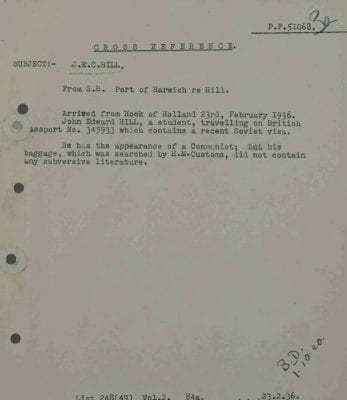
The files show he was turned down after applying for a post in military intelligence. He “should not be employed as a lecturer to the Forces”, MI5 insisted in 1946.
In 1953, MI5 described Hill as a “popular history don at Balliol … a Marxist and Communist party member”. It added, apparently with relief: “He does not, however, engage in Soviet studies. His period is the seventeenth century.”
One file contains a copy of a letter to Tribune supporting an anti-nuclear bomb march organised for 27 November 1959. It was signed by Murdoch, Taylor and Warnock, as well as Hill. MI5 had opened personal files on all of them.
Three years later, in October 1961, MI5 noted that Hill had become “a strong supporter of the Campaign for Nuclear Disarmament”. It added: “This fact, however, does not shed any light on his political sympathies, since very many shades of left wing opinion are opposed to nuclear weapons.”
Lord Lipsey, who had been asked by Hobsbawm to inquire about the possibility of MI5 keeping files on him, said on Thursday: “As a supporter of increased openness I am at least delighted that these files have finally been released.”
Eric Hobsbawm
Born: Alexandria, June 1917
Died: September 2012
Main Works:
The Age of Revolution (1962)
Industry and Empire (1968)
The Age of Capital (1975)
The Age of Empire (1987)
The Age of Extremes (1994)
Interesting Times (2002)
Globalisation, Democracy and Terrorism (2007)
How to Change the World (2011)
(Hobsbawm also wrote The Jazz Scene (1959), originally under the pseudonym, Francis Newton)
Christopher Hill
Born: York, 1912
Died: February 2003
Main works:
Economic Problems Of The Church (1955)
Puritanism And Revolution (1958)
Society And Puritanism In Pre-Revolutionary England (1964)
Intellectual Origins Of The English Revolution (1965)
God’s Englishman (1970)
The Century Of Revolution (1961)
Reformation To Industrial Revolution (1967).
The World Turned Upside Down (1972)
Milton And The English Revolution (1977)
Some Intellectual Consequences Of The English Revolution (1980)
The World Of The Muggletonians (1983)
The Experience Of Defeat (1984)
John Bunyan and His Church (1988)
The English Bible In 17th-century England (1993)
Liberty Against The Law (1996)
• This article was amended on 29 October 2014 to clarify information about Eric Hobsbawm’s CH and the year Christopher Hill died.
Annotations by Patrice Greanville
NOTICE: YOUR SUBSCRIPTIONS (SIGNUPS TO OUR PERIODICAL BULLETIN) ARE COMPLETELY FREE, ALWAYS. AND WE DO NOT SELL OR RENT OUR EMAIL ADDRESS DATABASES.
Book Review: Agent Storm: My Life Inside al Qaeda and the CIA
Written by Eric Walberg Эрик Вальберг/ Уолберг إيريك ولبر
Review of Morten Storm with Paul Cruickshank and Tim Lister, Agent Storm: My Life Inside al Qaeda and the CIA, Atlantic Monthly Press, 2014.
ISBN 978-0-8021-2314-5
CLICK ON IMAGE TO EXPAND
 Summary: As ISIS continues to confound the West with its consolidation of a Salafist-inspired resurrection of a ‘caliphate’, the Danish mole responsible for leading the CIA to Anwar Awlaki has caused a scandal by publishing his memoirs of life “inside al Qaeda and the CIA”.
Summary: As ISIS continues to confound the West with its consolidation of a Salafist-inspired resurrection of a ‘caliphate’, the Danish mole responsible for leading the CIA to Anwar Awlaki has caused a scandal by publishing his memoirs of life “inside al Qaeda and the CIA”.
[dropcap]R[/dropcap]ecruiting Muslims has not been easy for western ‘intelligence’. The New York Police Department has tried for decades to recruit Muslim immigrants, and was finally embarrassed by a 2013 ACLU lawsuit to disband its most public recruiting unit, which essentially blackmailed anyone with a Muslim name arrested on any pretext, including parking tickets. The most successful double agent prior to Morten Storm was Omar Nasiri (b. 1960s), the pseudonym of a Moroccan spy who infiltrated al-Qaeda, attending training camps in Afghanistan and passing information to the UK and French intelligence services. He revealed all in his fascinating memoirs Inside the Jihad: My Life with Al Qaeda A Spy’s Story in 2006.
Nasiri offered his services not so much for money (at least, so he claims) but to counter the descent into violence among Islamists following the military coup against the elected Islamist government in Algeria in 1992. “The GIA [the Algerian Armed Islamic Groups] was riddled from the start with spies from the Algerian secret service” and “agent provocateurs who by 1995 were deliberately shifting the campaign of violence into France, to try and draw Paris into the conflict in opposition to the Islamists and in support of the Algerian state.”
Nasiri realized the GIA was undermining the genuine Islamist struggle and he suddenly found that the French and British intelligence were his allies (however dubious) against rogue elements in the Algerian military dictatorship. Nasiri, who seems to be a sincere Muslim, bitterly opposed to the Wahhabis and Salafis, did not prevent any spectacular terrorist attacks, but by monitoring the jihadist movement in Europe in the 1990s, was instrumental in helping intelligence agencies keep track of recruiting. His loudly proclaimed motive in helping the French and British security forces was to prevent terrorism, though he still wants imperialists out (and told his minders so to the end), and wants a dignified Muslim culture not modelled on the West.
“What I want more than anything is to save Islam from these terrible excesses and innovations.” The insurgents buying Israeli Uzi machine guns was humiliating, but “now something much worse is happening: we’re fighting our wars using our enemies’ tactics. If we, as Muslims, let ourselves become like them—which is to say, like you—then there will be nothing left to fight for. This is my jihad.”
On BBC in 2006 he said that the UK intelligence services were warned in the mid-1990s about the threat posed by al-Qaeda, but failed to act quickly enough. He ended his covert activities by 2000, offered to renew them after 9/11 but was snubbed by German intelligence. He now lives under a pseudonym. His memoirs are an indictment of both the West’s policies in the Middle East and the bureaucratic bungling of the intelligence agencies.
Morten Storm is a very different kettle of fish. Born in 1976 in a troubled (white) environment, he was abused as a child, joined the feared Bandidos gang, and became a criminal tough convicted of multiple armed robberies and violence, earning up to $10,000 a week smuggling drugs through Europe. As a social outcast, he befriended Muslim immigrants, and converted to Islam in 1997 at the age of 21, inspired by a fellow prisoner Suleiman. A lost soul in search of meaning, he visited the (Salafi) Regent’s Park mosque, and was quickly recruited and offered a free study program in Yemen.
He adopted the Salafi Islamic package wholesale, even telling the head of the Muslim Brotherhood (MB) in Yemen, Sheikh Abdul Majeed al-Zindani, that “you will lead me to hellfire,” since the MB are “innovators where it suited their political ends”, supporting the concept of democratic elections. (Zindani is no shrinking violet. Banned from the US since 2004 as a “Specially Designated Global Terrorist”, he was acquainted with Osama bin Laden and Anwar Awlaki.)
CLICK TO EXPAND
Storm became a street militant and martial-arts trainer in London, joining the inner circle of leading radical cleric Omar Bakri who was active in Hizb ut-Tahrir and Al-Muhajiroun in the UK (he was arrested in 2010 in Lebanon).
Storm’s dubious credibility, given his background, never seemed to have bothered his Salafi brothers. But his Islam soon proved to be skin-deep. He missed his cocaine, drinking and cavorting, and was successfully recruited by the Danish Security and Intelligence Service (PET) in 2006, after a crisis of faith. He couldn’t accept the Salafi “drumbeat of jihadism … moving on from the defence of Muslim lands towards a declaration of war against all disbelievers.”
He flitted back and forth from the UK and Denmark to Yemen, and befriended Anwar Awlaki, even arranging his final marriage—to a Croatian Muslim convert ‘Aminah’ (born Irena Horak) in 2010, for which the CIA paid him $250,000 (his memoirs proudly include a picture of the suitcase full of US dollars). But his appetite proved equal to the talks, and he was soon cash-starved, so he agreed to help the CIA assassinate his friend Awlaki, hoping to pocket the $5m reward. Awlaki was killed in September 2011, but the CIA never coughed up, and Storm decided to go public with a series of articles in Jyllands-Posten (publisher of the notorious cartoons caricaturing the Prophet Muhammed in 2005), and publish his memoirs, which like Nasiri’s, show the ‘intelligence’ agencies in a shocking light.
But, unlike Nasiri, Storm is genuinely proud to be fighting Islam. “In a school project, my son Osama decided to make me his subject … and wrote an essay entitled: ‘My Dad, the Hero’.” Storm has twinges of regret for murdering his bosom buddy (if his claims are to be believed). Nowhere in the memoir is Awlaki’s guilt for any terrorist operation actually shown without a doubt. He was rather always on the run, writing fiery tracts for Inspire, encrypting messages, and trying—mostly unsuccessfully—supplies of items that might or might not be for building bombs.
All this seems faintly irrelevant given IS’s success in the past six months. What formerly looked like a wildly optimistic long term plan on the part of al-Qaeda remains eerily on-track despite the killing of thousands of “terrorists”, including Bin Laden and Awlaki.
What can we learn from these memoirs?
First, while Wahhabi-inspired Islam attracts some disillusioned westerners, their commitment is easily jettisoned. Its rote nature creates a rigid mindset conducive to both terrorism and corruption. For the past three decades thousands of Saudi youth have chosen death fighting the corrupt, pro-US monarchy, be it by fighting in Syria-Iraq or underground in Saudi Arabia. Uneducated westerners like Storm are easily seduced by a kind word from a Salafi imam, an offer of a free study course in Yemen, and the simplistic rote beliefs of Wahhabism, which dismiss the scholarly and peaceful activist tradition of the MB (let alone Shiism).
Storm’s most shocking revelation is his revelation of a letter from Saudi officials to Al-Qaeda in the Arab Peninsula leader Nasir al-Wuhayshi in 2011 proposing a deal: “They would pardon Wuhayshi and donate weapons and money if they stopped fighting the Saudis and the Americans and focused instead on fighting Shia rebels in northern Yemen.”
Clearly, for western converts to Islam, however well-meaning, secular consumerism is a heavy burden hard to shake. Despite admiring Islam for its truths and its great history, Storm was unable to shed his cultural baggage.
For a century now, since western secularism has taken hold, many disillusioned western youth have embraced eastern beliefs, including Buddhism, Hinduism and Islam. But the first two stop short of trying to transform society through a political movement of reform. Islam does not shy away from politics; that is why spies like Nasiri keep the faith, while flotsam like Storm stumble into Wahhabism, which mimics the nihilism of western anarchism.
Some western strategists reach out to nonviolent Islamists such as the Muslim Brotherhood. In 2010, President Obama issued Presidential Study Directive 11 (PSD-11) advising a shift from support for dictators to working with “moderate” Islamic political movements (though his actions since then show how wobbly this commitment to peaceful evolution is). They are searching for ways other than war to deal with the now uncontrollable extremists, to stabilize Muslim society where the post-colonial neoliberal model has failed.
Other strategists, like Storm’s handlers, continue to live in a fantasy world of 007 and double agents, sure that if they can only kill that nasty Bin Laden, Awlaki, whomever, we will all live happily ever after.
ABOUT THE AUTHOR
 Eric Walberg is a Canadian writer specializing in the Middle East, Central Asia and Russia. He is a graduate of Cambridge University and has lived in both the Soviet Union and Russia, and then Uzbekistan, as a UN adviser, writer, translator and lecturer. He has been writing on East-West relations since the 1980s, presently for Al-Ahram Weekly and is a regular contributor to several globally-recognized websites, and a commentator on Voice of the Cape radio. His articles appear in Russian, German, Spanish and Arabic and are available at his website http://ericwalberg.com.
Eric Walberg is a Canadian writer specializing in the Middle East, Central Asia and Russia. He is a graduate of Cambridge University and has lived in both the Soviet Union and Russia, and then Uzbekistan, as a UN adviser, writer, translator and lecturer. He has been writing on East-West relations since the 1980s, presently for Al-Ahram Weekly and is a regular contributor to several globally-recognized websites, and a commentator on Voice of the Cape radio. His articles appear in Russian, German, Spanish and Arabic and are available at his website http://ericwalberg.com.
•
NOTICE: YOUR SUBSCRIPTIONS (SIGNUPS TO OUR PERIODICAL BULLETIN) ARE COMPLETELY FREE, ALWAYS. AND WE DO NOT SELL OR RENT OUR EMAIL ADDRESS DATABASES.
Revolution in the United States

For many years the Shah of Iran was Washington’s favorite tyrant in the Middle East. Callous disregard for the rights and suffering of victimized populations continues to be the default position of US foreign policy around the globe.
[dropcap]H[/dropcap]ow can it be just that so few dictate the lives of so many? And I’m not referring to the 1 percent and the 99 percent. I’m speaking of the voting population in the United States and its minions Canada and Britain. Meanwhile, the billions of people around the world whose lives are directly impacted by the decisions made by elected officials in these wealthy nations have virtually no voice. The US Empire is far from democratic. It is authoritarian! It is imperialist! It is unjust! And a revolution is needed.
In the 2012 presidential election, 121 million Americans voted, which constituted 57 percent of the voting age population. This voter turnout, while not a significant majority, nevertheless provides legitimacy for the US political system, particularly in the eyes of many Americans.
But the political decisions made by elected US officials reach far beyond that nation’s borders. Through its foreign policy and its dominant role in international institutions such as the United Nations Security Council, NATO, the International Monetary Fund (IMF) and the World Bank, the United States impacts the lives of virtually everyone on the planet. In other words, the electoral choices of 121 million Americans directly impact the lives of billions of people around the world. How is this democratic?
National borders are repeatedly decimated in the name of ‘free market’ capitalism so that corporations can freely move their capital and profits around the globe to take advantage of cheap labour and natural resources, particularly in the global South. But while the economy is becoming increasingly globalized, democracy remains rooted in the nation-state.
But all nations are not equal. The United States has inherited the role that European colonizers played for hundreds of years. And like the ruling powers in the old colonial system, the United States wields a disproportionate amount of political, economic and military power in contemporary imperialism. As a result of this dominance, 121 million American voters hold the fate of billions in their hands every four years.
But the fate of the world’s population is the farthest thing from the minds of most US voters at election time. They are primarily focused on their own immediate needs such as jobs, taxes, security and other issues that they perceive to be of importance to their daily lives. They are not concerned with—or fail to see—how the political, economic and military policies implemented globally by the government they elect negatively impact many people around the world. Consequently, there is little chance of Americans voting against what they perceive to be their own interests for the benefit of a majority of the world’s population.
But what happens when those people negatively impacted by US policies attempt to take matters into their own hands and challenge the undemocratic US imperialist model? Washington inevitably responds in violent ways to defend the status quo. This is why so many people around the world do not believe that the United States is a force for good. In fact, in a 2013 WIN/Gallup poll conducted in 68 countries, the United States was overwhelmingly viewed as the greatest threat to world peace—as it is each year the survey is conducted.
The American Empire
Washington’s global political dominance manifests itself through military and economic support to allied governments regardless of how corrupt, undemocratic and violent they may be in order to defend US interests. These interests primarily consist of enabling the profit-taking activities of multinational corporations and ensuring a continuation of the consumer lifestyle enjoyed by many Americans.
The consequences of prioritizing corporate profits and consumer lifestyles in wealthy nations have been devastating for many around the world. According to the World Health Organization, more than 10 million people die annually in Latin America, Africa and Asia due to a lack of access to adequate healthcare and medicines. This is the inevitable result of the capitalist system, which prioritizes profits over everything else.
For example, it is more profitable for pharmaceutical companies to produce ‘lifestyle’ drugs to address such issues as baldness and other non-life threatening conditions for people in wealthy nations who can afford to purchase them than to 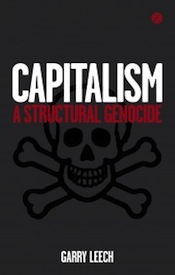 manufacture essential medicines for the poor who do not constitute a viable market. The inevitable consequence is structural genocide; a tragedy that has be made more visible by the Ebola epidemic in West Africa.
manufacture essential medicines for the poor who do not constitute a viable market. The inevitable consequence is structural genocide; a tragedy that has be made more visible by the Ebola epidemic in West Africa.
When governments do come to power and challenge US interests then Washington inevitably responds with economic sanctions, support for a military coup and, if necessary, direct military intervention. The objective is to ensure that the capitalist model is the dominant social model throughout the world. And in order to ensure that this model is accepted as legitimate it is crucial that populations around the world internalize Western liberal values. This is precisely why the ongoing US military interventions in the Islamic world are, despite the rhetoric emanating from the White House, a war against Islam. The acceptance of Western liberal values is essential for the perpetuation of capitalism and many of these individualistic values contravene some of the collectivist values found in Islam.
The ongoing military interventions in the Middle East and Central Asia are a continuation of the empire-building that began in 1492 after Christopher Columbus ‘discovered’ the Americas. The values and cultural practices of the indigenous peoples of the Americas were not aligned with the liberal and Christian religious values prominent in Europe, particularly Enlightenment thought, which provided the philosophical foundation for capitalism. Consequently, those indigenous that resisted—and many who didn’t resist—the imposition of European values onto their cultures were slaughtered.

During his 30-year rule the Shah paid many state visits to America. He was the first Islamic ruler to recognize Israel. (The Mossad trained his brutal Savak police along with the CIA.)
Most of those that survived were effectively interned in reservations and generation after generation subjected to forced assimilation through a Eurocentric education system. Similarly in Africa and Asia, European colonialism imposed liberal ideas and Christianity on peoples in order to inculcate them with the Western values essential to validate the capitalist system that drove the colonial project.
More recent attempts to challenge this imperialist process have similarly been met with violence. The United States has overthrown virtually all governments that have challenged its hegemony. Just a partial list of countries whose governments were overthrown by US-backed coups or military interventions in recent decades includes Iran (1953), Guatemala (1954), South Vietnam (1963), Brazil (1964), Indonesia (1965), Chile (1973), Argentina (1976), Haiti (1991 and 2004), Afghanistan (2001), Iraq (2003), Honduras (2009) and Libya (2011). Some of these governments were democratically-elected in free and fair elections.
More recent attempts to challenge this imperialist process have similarly been met with violence. The United States has overthrown virtually all governments that have challenged its hegemony.
Other governments that have dared to challenge US hegemony have managed against great odds to survive all efforts to bring them down. Cuba repelled the Bay of Pigs invasion in 1961 and has endured an inhumane US-imposed economic blockade for more than half a century. The UN General Assembly recently voted overwhelming for the 23rd time to condemn the blockade with 188 countries calling for its end and only two—the United States and Israel—voting against the resolution. Similarly, Venezuela survived a US-supported coup attempt against President Hugo Chávez in 2002 and continues to be routinely demonized by US policymakers.
Radicalizing Islam
US militarism in the Islamic world has similarly sought to challenge those who resist the implementation of the Western liberal values essential for capitalist globalization. Fifty years ago there were no prominent extremist Islamic groups. The contemporary evolution of extremism can be dated to the US-backed overthrow of Iran’s popular moderate and largely secular Prime Minister Mohamad Mossadegh in 1953 after he nationalized the oil industry. The Shah was re-instated as ruler of Iran and he immediately re-opened the country to Western oil companies while his US-trained secret police brutally repressed all dissent.
It was under the despotic rule of the US-backed Shah that Western cultural practices became commonplace in Iran due to the presence of so many US and British oil workers. Meanwhile, increasing numbers of Iranians were enduring poverty while the Shah and Western oil workers flaunted the country’s resource wealth in their faces. The growing resentment caused by these circumstances provided an ideal environment for Islamic fundamentalists to make inroads among the Iranian population. And by 1979, the majority of Iranians supported the fundamentalist revolution that overthrew the corrupt and brutal regime of the Shah.
In the ensuing decades, Washington’s support for corrupt regimes in the region that serve Western interests, particularly with regard to ensuring a steady flow of oil, has further radicalized elements of the Islamic world. The United States also provided more than $4 billion in military and economic aid to Mujahideen rebels fighting against the Soviet Union in Afghanistan during the 1980s. One of the Mujahideen rebels supported by Washington was Osama bin Laden who, following the removal of the Soviet Western invaders from the Islamic world, founded Al-Qaeda and shifted his sights onto the latest Western invader when the US military established bases in Saudi Arabia in 1991. The numerous US military interventions in the region since 1991and Washington’s unconditional support for Israel have only added fuel to the fire of extremism.
It is clear that US military intervention in the Middle East is not motivated by the promotion of democracy and human rights. After all, if US foreign policy were motivated at all by these noble causes then Washington would have long ago overthrown the ruthless dictatorship that governs its close ally Saudi Arabia and rid the region of its other authoritarian friends. And given that the Saudi government routinely publicly beheads its own citizens—19 in July and August—Obama’s decision to commit the US military to fight alongside the Saudi beheaders against the Islamic State beheaders speaks volumes about human rights. Evidently, it is not beheading per se that makes one ‘evil,’ but rather the beheading of Westerners in order to challenge US economic interests.
The failure of moderate and more secular nationalist groups to address the needs of Muslims has resulted in the emergence of more radical fundamentalist organizations such as Hezbollah, Hamas, the Taliban, al-Qaeda and now the Islamic State. In short, we are witnessing a radicalization on a regional scale similar to that which occurred nationally in Iran following US intervention in that country and support for the Shah’s brutal regime.
Washington’s imperialist policies have prioritized the interests of Western oil companies and Western economies over those of Islamic peoples. Not surprisingly, this has resulted in a radicalization of the growing opposition to US military, political and economic interventions in the Islamic world. The US response to this emerging radicalism hasn’t been a re-evaluation of its imperialist approach in the Islamic world, but rather to intensify it. How else can the US-led military invasions and occupations of Afghanistan and Iraq be explained? In both countries, the objective was to militarily impose Western liberal democracies on Islamic peoples and to incorporate the resources and economies of these nations into the global capitalist system.
Despite the oft-repeated rhetoric of Western leaders that military intervention in the region does not constitute a war against Islam, it is a war against Islam. It is a war against those Islamic values that are contrary to the gross and inhumane profit-taking of multinational corporations and investment banks. It is a war against those collective values and beliefs that conflict with the individualistic and self-indulgent consumer culture at the core of Western capitalism. It is a war against those Muslims who have become disenchanted with a democratic model and economic system that has left them disempowered and impoverished.
Not only has neoliberal globalization left many in the Islamic world in poverty, but it has also failed to give them any meaningful political voice through the ballot box. When Muslims elect an Islamic party to power in Western-style elections, the new government is immediately targeted by the United States and its allies. Egyptians took to the streets in 2011 as part of the Arab Spring uprisings to demand the removal of the country’s US-backed dictator Hosni Mubarak and that elections be held. The following year a majority of Egyptians elected the presidential candidate who represented the country’s leading Islamic organization, the Muslim Brotherhood. One year later, Washington and its allies gladly turned a blind eye when the US-backed Egyptian military overthrew the new democratically-elected government.
This was not the first time that Western powers undermined democracy in the Islamic world. In 1991, when parliamentary election results in Algeria made it apparent that the Islamic Salvation Front would win a two-thirds majority, the military stepped in and annulled the election rather than allow an Islamic party to gain power. The United States and France supported the coup because they were opposed to the establishment of an Islamic government in Algeria, even though it would have been a democratically-elected government that represented the wishes of a majority of Algerians. The price of this abrogation of the democratic process was a civil war that resulted in the deaths of more than 150,000 people over the next decade.
Similarly in 2006, the Palestinian people voted in favor of the Islamic party of Hamas over the more moderate Fatah Party, with the former winning 76 seats to the latter’s 45, thereby allowing Hamas to head the government. The United States, Canada and the European Union responded to the election results by immediately cutting off funding to the new Hamas-led government and allowing Israel to implement an inhumane blockade of the Hamas stronghold of Gaza. These cases send a clear message to Muslims: Accept Western-style democracy but do not elect an Islamic party. Is it any surprise that growing numbers of Muslims are becoming disenchanted with Western-style democracy and a global economic system that primarily serves Western interests?
This growing disenchantment has manifested itself in a new ‘threat’ that has emerged from the US invasion and occupation of Iraq. The Islamic State is even more extremist than al-Qaeda in its efforts to resist Western imperialism. Despite this reality, the Western response to the Islamic State is to replicate the previous military interventions in the Middle East that brought al-Qaeda and the Islamic State into existence in the first place.
Washington is intensifying a military intervention in the Islamic world that has already killed thousands of innocent civilians. In fact, the number of innocent Muslims killed by US bombs far surpasses the number of Westerners killed by extremist Islamic groups. History suggests that even if the United States and its allies militarily defeat the Islamic State, the inevitable killing of civilians by Western forces will result in its replacement by an even more extreme group.
The real reason the United States and its Western allies are targeting the Islamic State becomes apparent when that extremist group is compared to the Mexican drug cartels. Mexico’s cartels pose a much greater violent threat to civilians, including Americans, than does the Islamic State. They killed more than 16,000 people in 2013, almost double the number that died in Iraq. More crucially from the US perspective, more than 300 US citizens have been killed by Mexico’s drug cartels in the past six years, which far surpasses the number of Americans killed by the Islamic State.
Furthermore, the cartels not only behead many of their victims, they dismember their entire bodies. They also routinely enlist youth as young as eleven and regularly target women and children. The cartels control vast tracts of territory in Northern Mexico and the government cannot defeat them. And yet, we are not bombing Northern Mexico to eliminate this violent group. Why not? Because it is not human rights or democracy promotion that motivates the US government to act; Washington responds to perceived threats to the capitalist system.
In Mexico, the violent actions of the drug cartels do not infringe on the capacity of multinational corporations to generate profits through the exploitation of that country’s cheap labour and natural resources. The drug cartels do not interfere with the free trade economic model, which is most visibly represented in Mexico by the North American Free Trade Agreement (NAFTA). As a matter of fact, drug traffickers rely on the constant and uninterrupted flow of trade across the US-Mexico border to transport their product. In short, unlike the Islamic State, Mexico’s drug cartels do not constitute a challenge to Western liberal values and the capitalist economic model promoted by the United States.
Conclusion
Western imperialism has spent the better part of five hundred years trying to impose Western values on peoples throughout the world. These peoples have never had a meaningful voice in the political, social and economic policies that have been imposed on them. Imperialism, by definition, is undemocratic. While the policies of the US government impact billions of people around the world, only a tiny percentage of the global population have any say in electing that government. And the overwhelming majority of the 121 million Americans who vote give little thought to how their ballot will impact Muslims in the Middle East, indigenous peoples in Latin America, and billions of others throughout Africa and Asia. Their voting decisions are primarily determined by their perceived immediate needs, which provides a veneer of legitimacy not only to US democracy but also to US imperialism.
Consequently, it is highly unlikely that in the foreseeable future a revolution will occur in the imperial heartland. It is much more likely to occur in the outlying regions of the US Empire. In fact, it is already occurring in various forms, from the indigenous movements for autonomy in Latin America to the extremist Islamic fundamentalism of groups such as al-Qaeda and the Islamic State in the Middle East. At the current time, the overwhelming majority of the world’s population that stands opposed to US imperialism are moderates who are non-violently seeking autonomy and a meaningful voice in the major decisions that impact their lives. But if we continue to crush all moderate opposition to US imperialism, we will likely further spread the sort of extremism that has emerged in the Middle East.
For the world’s sake, it is crucial that a revolution occur that brings down the US imperialist system before the violent extremism it fuels leads to global chaos. And if the US Empire is not brought down by those living at its core then it must be overthrown by its ‘subjects’ in the outlying regions who endure taxation—through the exploitation of their cheap labour and natural resources—without representation. After all, they have nothing to lose but their chains.
Garry Leech is a freelance journalist and author whose work is rooted in the global struggle for social justice. For 12 years (1999-2011) his investigative journalism focused primarily on the U.S. intervention in Colombia. During those years he investigated the “war on drugs” and the “war on terror” in addition to other issues related to human rights and globalization. Garry’s articles have appeared in numerous publications in the United States, Canada, Europe, Australia and Latin America as well as in Colombia Journal, an online publication he edited for eleven years (2000-2011). And while he is no longer updating Colombia Journal, its more than 300 articles by a wide variety of authors remain available online as a valuable resource for anyone interested in the U.S. intervention in Colombia.
Garry has also authored seven books, some of which focus on Colombia while others offer a broader critique of capitalist globalization. These books include Capitalism: A Structural Genocide (Zed Books, 2012), Beyond Bogotá: Diary of a Drug War Journalist in Colombia (Beacon Press, 2009) and Crude Interventions: The United States, Oil and the New World Disorder (Zed Books, 2006).
NOTICE: YOUR SUBSCRIPTIONS (SIGNUPS TO OUR PERIODICAL BULLETIN) ARE COMPLETELY FREE, ALWAYS. AND WE DO NOT SELL OR RENT OUR EMAIL ADDRESS DATABASES.
Washington’s Moderates— From Nazis to Violent Sunni Muslim Fundamentalists
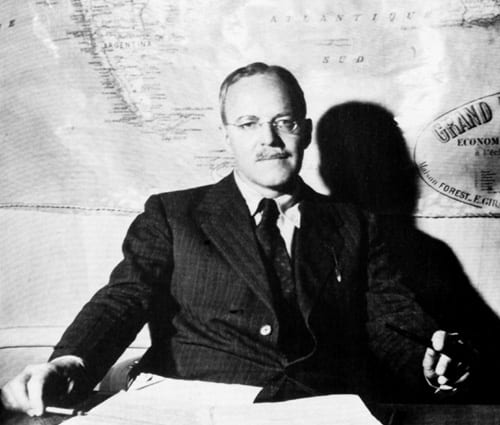
Allen Dulles, OSS, CIA—The template for the “gentlemen” scumbags who would save the world from the “communist menace.”
Stephen Gowans
[dropcap]A[/dropcap] story by Eric Lichtblau in The New York Times of October 26, 2014 (“In Cold War, U.S. spy agencies used 1,000 Nazis”) raises the question of how moderate the United States’ “moderate” allies–including the so-called “moderate” Syrian rebels–really are.
Lichtbau’s story concerns newly declassified documents showing that the CIA and FBI employed at least a thousand, and likely more, Nazis and Nazi-collaborators as spies and informants during the Cold War.
What’s striking about the story is the revelation that Allen Dulles, at the time head of the CIA, described Nazis on the US payroll as “moderates.”
It’s difficult to see how Nazis could be described as moderates. But maybe it depends on your politics. As Victor Kiernan pointed out in America: The New Imperialism, Dulles’ sister was so “overflowing with admiration for Nazism that she settled in Germany to bask in its rays.” Perhaps her brother felt the same—in which case, Nazis may indeed have genuinely appeared to the country’s chief spy to be moderates.
Among the “moderate” Nazis pressed into service by Dulles as spies, and by FBI director J. Edgar Hoover as informants, were:
• Ex-Nazi police officials and East European collaborators who, it is said, were manifestly guilty of war crimes.
• Otto von Bolschwing, a top aide to Adolf Eichmann, who wrote policy papers on how to terrorize Jews.
• Aleksandras Lileikis, a Lithuanian Nazi collaborator who the US Justice Department’s Nazi-hunting unit said “was a senior perpetrator of the Holocaust.”
Hoover dismissed accusations that his Nazi informants had committed wartime atrocities as Soviet propaganda. Syrian leader Bashar al-Assad’s accusations in 2011 that the uprising in his country was driven by militant Islamists with foreign backing was similarly dismissed by US officials as propaganda—until the weight of evidence intervened.
 A NOTABLE CASE IN POINT : OSS EXECUTIVE ALLEN DULLES RESCUES THE GESTAPO CHIEF IN ITALY. Click on the bar below.
A NOTABLE CASE IN POINT : OSS EXECUTIVE ALLEN DULLES RESCUES THE GESTAPO CHIEF IN ITALY. Click on the bar below.
[learn_more caption=”Dulles was in bed with the Nazis from the start”]
 1945: ITALY. Nazi shyster and Hitler Project kingpin Allen Dulles, in his new job as Office of Strategic Services (OSS) operative, arranges for the OSS to rescue his good buddy, SS Obergruppenfuhrer Karl Wolff (left), head of the Gestapo in Italy and SS head Heinrich Himmler’s right hand man, who has been captured by Italian partisans. Obergruppenfuhrer Wolff had been on his way to meet Dulles in Bern, Switzerland to negotiate the terms of Operation Sunrise under which thousands of Nazi war criminals and mass murderers will escape prosecution for war crimes and become employees of the government of the United States. SOURCE: Making the World Safe for Hypocrisy.[/learn_more]
1945: ITALY. Nazi shyster and Hitler Project kingpin Allen Dulles, in his new job as Office of Strategic Services (OSS) operative, arranges for the OSS to rescue his good buddy, SS Obergruppenfuhrer Karl Wolff (left), head of the Gestapo in Italy and SS head Heinrich Himmler’s right hand man, who has been captured by Italian partisans. Obergruppenfuhrer Wolff had been on his way to meet Dulles in Bern, Switzerland to negotiate the terms of Operation Sunrise under which thousands of Nazi war criminals and mass murderers will escape prosecution for war crimes and become employees of the government of the United States. SOURCE: Making the World Safe for Hypocrisy.[/learn_more]
Before Germany declared war on the United States, Washington didn’t think the Nazis were so bad. To the contrary, there was much the Nazis did that the intertwined US economic and political elites admired. Hitler’s forces shut down trade unions, banned leftist political parties, jailed communists, and sought to destroy the Soviet Union. After the war, Nazis were recruited to carry on in pursuit of the same goals, undermining the USSR and sabotaging socialism in eastern Europe.
Similarly, Washington didn’t think the violent Sunni Muslim fanatics who sought to overthrow the secular nationalist government of Bashar al-Assad were so bad when the point of their dagger was directed at the heart of the Syrian president. It was only when ISIS threatened to take control of Iraqi oil fields that they became a threat to be eliminated. At that point, the Islamic State’s commitment to a harsh 18-century Wahhabism-inspired Islam became intolerable, though only in the official rhetoric. The reality is otherwise. Wahhabism is the official ideology of Saudi Arabia, a family dictatorship Washington supports strongly. The beheading-practicing, anti-Shia, theological absolutist monarchy that presides over much of the Arabian Peninsula is sometimes described as “moderate” in Washington.
Observers who closely follow events in Syria argue that the “moderate” Syrian rebels are a myth. In his latest book, The Jihadis Return: ISIS and the New Sunni Uprising, veteran Middle East correspondent Patrick Cockburn observes that there is “no dividing wall” between “America’s supposedly moderate opposition allies” and al-Qaeda-linked ISIS and al-Qaeda’s official franchise in Syria, the Nusra Front (with which the “moderate” rebels cooperate.) Others point out that almost all rebel groups in Syria are made up of violent Sunni Muslim fanatics whose aim is to replace Syria’s secular constitution with a Sunni Muslim interpretation of the Koran.
But, then, if, in the official rhetoric of Washington, Nazis are labelled as moderates when they’re useful in achieving US foreign policy goals, it should come as no surprise that misogynist, sectarian, head-chopping Sunni extremists whose aims intersect with the US foreign policy objective of ousting Assad’s government should be similarly sanitized as “moderates.”
In Washington, a group or country’s moderation has nothing to do with methods, and everything to do with aims. Nazism became unacceptable only when Germany declared war on the United States. Before that, and after Germany’s defeat, Nazism was okay. It opposed the Soviet Union and the left—a battle the US elite applauded.
Similarly, violent Sunni Muslim fundamentalism became unacceptable only when it challenged US domination of the Middle East and the region’s petroleum resources. As a dagger directed at a pro-Soviet leftist government in Afghanistan in the 1980s, against the secular nationalist government in Libya in 2011, and against the secular nationalist government in Syria over the last three years, it’s tolerated, indeed, encouraged and built up.
Moderation is in the eye of the beholder—which speaks volumes about the politics of a state that labels Nazis and violent Sunni Muslim fundamentalists as moderates.
